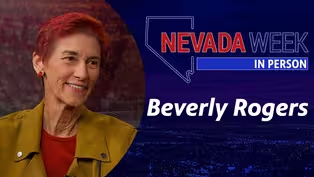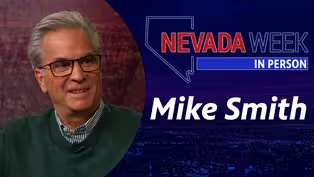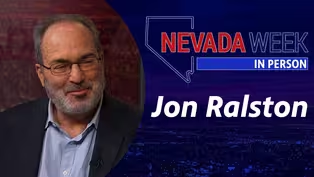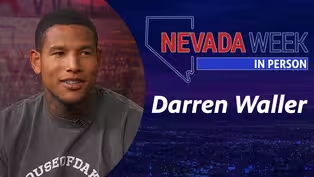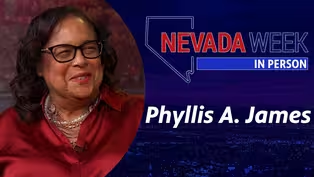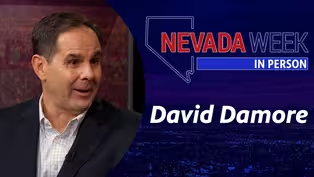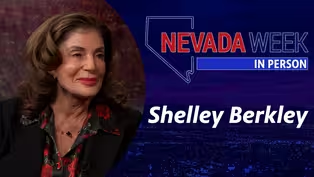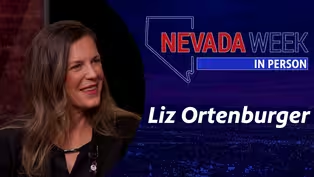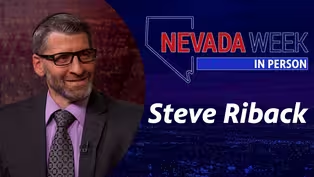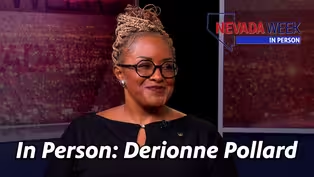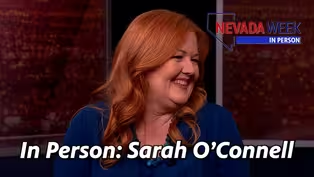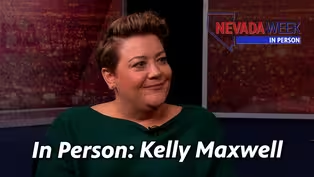
Nevada Week In Person | Julian Escutia Rodriguez
Season 1 Episode 33 | 14mVideo has Closed Captions
One-on-one interview with Consul of Mexico in Nevada Julian Escutia Rodriguez.
One-on-one interview with Consul of Mexico in Nevada Julian Escutia Rodriguez.
Problems playing video? | Closed Captioning Feedback
Problems playing video? | Closed Captioning Feedback
Nevada Week In Person is a local public television program presented by Vegas PBS

Nevada Week In Person | Julian Escutia Rodriguez
Season 1 Episode 33 | 14mVideo has Closed Captions
One-on-one interview with Consul of Mexico in Nevada Julian Escutia Rodriguez.
Problems playing video? | Closed Captioning Feedback
How to Watch Nevada Week In Person
Nevada Week In Person is available to stream on pbs.org and the free PBS App, available on iPhone, Apple TV, Android TV, Android smartphones, Amazon Fire TV, Amazon Fire Tablet, Roku, Samsung Smart TV, and Vizio.
Providing Support for PBS.org
Learn Moreabout PBS online sponsorshipMore from This Collection
Nevada Week In Person goes beyond the roundtable discussion of Nevada Week with guests for a more casual conversation about their personal passions, new projects and compelling stories that are overlooked in the flurry of the news cycle.
Nevada Week In Person | Beverly Rogers
Video has Closed Captions
One-on-one interview with Rogers Foundation chair Beverly Rogers. (14m)
Nevada Week In Person | Mike Smith
Video has Closed Captions
One-on-one interview with Las Vegas Sun political cartoonist Mike Smith. (14m)
Nevada Week In Person | Jon Ralston
Video has Closed Captions
One-on-one interview with The Nevada Independent CEO Jon Ralston. (14m)
Nevada Week In Person | Darren Waller
Video has Closed Captions
One-on-one interview with Las Vegas Raider tight end Darren Waller. (14m)
Nevada Week In Person | Phyllis A. James
Video has Closed Captions
One-on-one interview Phyllis A. James. (14m)
Nevada Week In Person | David Damore
Video has Closed Captions
One-on-one interview with Chair of the Department of Political Science at UNLV David Damor (14m)
Nevada Week In Person | Shelley Berkley
Video has Closed Captions
One-on-one interview Senior Vice President for Touro University Shelley Berkley. (14m)
Nevada Week In Person | Liz Ortenburger
Video has Closed Captions
One-on-one interview with SafeNest CEO Liz Ortenburger. (14m)
Nevada Week In Person | Steve Riback
Video has Closed Captions
One-on-one interview with Las Vegas Metro Police Lieutenant Steve Riback. (14m)
Nevada Week In Person | DeRionne Pollard
Video has Closed Captions
One-on-one interview Nevada State College President DeRionne Pollard. (14m)
Nevada Week In Person | Sarah O’Connell
Video has Closed Captions
One-on-one interview with Director of Eat More Art LLC Sarah O’Connell. (14m)
Nevada Week In Person | Kelly Maxwell
Video has Closed Captions
One-on-one interview with Baby’s Bounty Executive Director Kelly Maxwell. (14m)
Providing Support for PBS.org
Learn Moreabout PBS online sponsorship-A Career Diplomat with nearly 20 years of experience, the Consul of Mexico in Las Vegas, Julian Escutia Rodriguez joins us this week for Nevada Week In Person.
♪♪♪ Support for Nevada Week In Person is provided by Senator William H. Hernstadt and additional supporting sponsors.
-Welcome to Nevada Week In Person.
I'm Amber Renee Dixon.
In 2020, Mexico made him the country's consul in Las Vegas.
He's charged with protecting the best interests of Mexican citizens living and traveling here.
Julian Escutia Rodriguez, thank you so much for joining us.
-Thanks very much for having me.
-When I think of a consulate office, I think of getting your visa or getting a passport, but your role is a lot bigger than that.
What else are you responsible for?
-Well, the Consulates of Mexico are really immigrant integration centers.
We help immigrants better integrate into the economy and society of Nevada in this case.
We provide assistance in health issues, education issues, financial literacy.
We also promote trade and investment both ways, obviously.
Tourism, that is very important for Las Vegas.
And I'm the consul of Mexico in the whole state of Nevada.
So I travel up North to do our consulates, to meet with authorities.
So it's a very interesting job.
-One example of your statewide efforts would be in a scholarship that was provided as a 10-year anniversary recognition of DACA, which was the Deferred Action for Childhood Arrivals program.
That was in June, the 10-year anniversary.
Firstly, will you remind us what DACA did, and where were you at that time you were working in this field.
What did you think?
-Well, I was very fortunate to be in Washington, D.C., in 2012.
I was in the room on June 14, 2012, when the White House announced privately to the organizations and to Dreamers that they were announcing this program.
So there were tears, shouts, I mean, it was really moving.
And we have served over half a million Mexicans that are benefiting from this program that allows them to work and drive and have families.
And so it's a very important problem for Mexico and for all immigrants.
This year, I decided to raise some money to have a bigger amount of scholarships for adult education and Dreamers.
So undocumented people do not have access to the regular scholarships that are out there, Federal or state.
So I wanted to have more resources for them; that they want to continue their studies, but sometimes they lack the resources.
So with these scholarships, they will make it.
-And remind people what Dreamers are because it's been a while since that passed, and I think some people may have forgotten.
-Dreamers is a big group of people, undocumented youth.
The thing is that many of them are not that young anymore.
I mean, obviously they are young; they're 32 or 35, it depends.
So it's basically undocumented people that went through college and high school and now they have jobs.
And through DACA, they are able to do that legally.
-And they were brought to this country as young children and grew up here.
So for them to return to that country wouldn't have made any sense.
-Yeah.
So they are Americans by all means.
And they have contributed to this country so much, they have benefited so much from this country, so it just makes sense that they stay here and continue thriving.
-Speaking of studying, you studied at El Colegio de Mexico in Mexico City, as well as at Victoria University of Wellington in New Zealand.
Why New Zealand?
-My first diplomatic posting was the Embassy of Mexico in New Zealand.
And while there, I found that there's a very good public policy school or university.
So I signed up, and I did my master's there.
-And what kind of work did you do there?
What did you think of New Zealand?
How did it impact you?
-Yeah, a lot.
So it was my first posting, so that always influences a lot.
I was the consul there, so I took care of around 500 Mexicans, only 500.
Here in Nevada I take care of 500,000 Mexicans, so it's quite different.
But being so far away and learning from that culture and from South Pacific cultures and nations, it is fantastic.
And the Maori culture is really similar to other Native Americans, Native Mexican people.
So through that, you see migration has an impact that has impacted humanity forever.
It was amazing to be in New Zealand.
-When you chose this career, what did you expect going into it?
I imagine that you're probably moving around a lot.
How often?
-We move, like every four or five years.
Many people think that diplomats are only in receptions and cocktails and just like very posh situations, but that's not the case.
Diplomacy has evolved so much.
For us, having 50 consulates in the US, having 12 million nationals here in the US is just rolling up our sleeves and working hand in hand with them, helping them better integrate, assimilate, and just making sure that they are happy and prosperous here.
-There is a big difference between a diplomat and an honorary diplomat.
Do you mind explaining that?
-Honorary diplomats, they are just representing a country.
As the name says, honorary.
They don't get paid.
It is just a title that-- Obviously, they do some work in promoting that country and better relations and friendship and so on.
But the real consuls in a way, we do the work.
We issue passports, we go to jails, we go to detention centers, we help domestic violence victims, we promote trade and investment.
So it's a very-- It's a mix of activities that we do.
-Give me an example of if-- Who would you be helping in the case of domestic violence?
Why would they not be utilizing local authorities here?
-We do, together with law enforcement and with organizations that are specialized in that.
In this case in Nevada, we have a memorandum of understanding with Safe Nest, a very powerful organization, not-for-profit.
So we work hand in hand.
And the thing is that our nationals feel safer and more comfortable coming first to us.
So that's how we take care of those cases, and then we advise them to go to police, to go to Safe Nest, or any other resources.
And we do that with all cases: immigration, family cases, domestic violence, even criminal cases.
-Wow!
As far as your career as a whole, what are some of your most proud moments?
-Before coming here, I was Chief of Staff to the Undersecretary for North America.
I was very involved in the negotiation of the USMCA, the new NAFTA.
So trade issues, it was important.
And then the last year in Mexico City, I was Director General for Protection of Mexicans Abroad, which means that I was in charge of Mexicans all over the world.
So whenever a Mexican had a problem, they would come to me.
And it just happened that when the pandemic started, there were Mexicans all over the world.
And the first 10 Mexicans that I was able to help to go out from Wuhan, China, the center of the COVID-19 pandemic.
So that was a very proud moment, to help those 10 Mexicans get away from that situation.
But then I sent, obviously with the help of the whole Mexican government, I sent like 15 airplanes to Peru.
There were like 5,000 Mexicans in Peru.
We didn't know that so many Mexicans were in Peru, and Peru was shut down.
So we had to send airplanes from the Mexican Air Force to take them out of there.
I helped three young girls that were in Madagascar.
Imagine that.
So with the help of the French government, we were able to help them.
I have a nice story of a Mexican ninja.
I call him that because he was in the middle of nowhere in China in a Kung Fu Academy.
So he was very happy, and his father wanted him to go back to Mexico.
So in a couple of months, we were able to take him out of China.
-Wow!
So during COVID in-- Well, you said that you got that post-2019, but 2020 was when COVID started.
And that's also, though, when you got the post here in Las Vegas.
So what was that transition like?
How did you apply those experiences here when we were in the height of the pandemic?
-The Minister of Foreign Affairs, Marcelo Ebrard, he sent me here to spearhead the efforts of prevention, vaccination, and in all public health promotion for our nationals here.
Obviously, they're here.
The authorities were doing a great job, but it was just adding the Spanish component to it, the Mexican component, and so I got really into it right away.
And I dedicated most of my time.
I think my first year here, it was 100% dedicated to public health.
-Oh, wow.
I remember seeing a picture of you getting a nasal swab, and that was part of the first demonstrations.
How of what was going to take place when people got tested, how was the process of informing the public?
Did you fear that you wouldn't get as much participation in testing and vaccinations, or was that ever an issue?
-So misinformation and lack of information has been our worst enemy in this pandemic.
We were able to get the message across in Spanish.
We went to the neighborhoods, we used media and social media.
So I think that we were quite successful.
But let me tell you that we continue doing it right now.
So now young kids from six months of age to five years of age, they can get the vaccine.
We are launching a new campaign, very active to get those children vaccinated.
We are continuing giving away test kits for COVID-19.
So the governor sent me like 20,000.
So every person that comes to the consulate gets two of those test kits.
We serve around 200 people every day at the Consulate of Mexico.
-Have you found hesitation from parents about getting their kids vaccinated?
-Yes, there is hesitation.
But I attribute it to lack of information and misinformation.
There's a lot of misinformation.
So we are debunking those needs, we are tackling those issues, talking family per family, one by one.
-You've been here two years now.
What have your takeaways of Las Vegas been?
What are your hopes and goals for this area?
-There's a lot of misinterpretation about Las Vegas.
In Mexico, people think that Las Vegas is just a Strip.
And it is not; it's much more than that.
There's construction, there's nurses, teachers, everything.
And I mean, Mexican nationals work here in all fields.
So I want to make sure that they are happy, that they are prosperous, that they are safe, and that they are contributing as a whole to the well-being of Nevada.
-How do you get that message across back home about what the reality is of Las Vegas?
I go back quite often.
We have media conferences, Zoom, and all of that.
So they are pretty aware that there's opportunities here for Mexican businesses, for Mexican people.
And the message is--I don't get tired of repeating--that we are not an island in the middle of Las Vegas.
It's not little Mexico.
No.
We are part of Las Vegas.
We are part of Nevada, and we want to contribute to the well-being of the whole state.
-And perhaps you're telling them about places like Henderson, for example.
You could come in and work in Henderson.
-Oh, yeah.
There's so many opportunities in Nevada.
There are so many jobs, and it's just a matter of reaching out to the consulate, follow us on social media, watch our stories, or knock on my door.
I'm there every day from eight to five.
So you can knock on my door, and I'll open the door and talk to you.
-Have you found a favorite Mexican restaurant?
-There are some good restaurants here.
I think that there's opportunities for better ones.
-Okay.
-So hopefully some entrepreneurs are listening to me now and check it out.
There's a lot of growth and a lot of interest in Mexican food here in Las Vegas.
In the Arts District and Downtown Las Vegas, there are new places opening up, so I encourage everyone to take a look at them.
What is the specific kind of food you want to be made better here?
-I mean, all Mexican food-- I mean, tacos are really good here because there are taco trucks and others.
But like more fine Mexican cuisine, that would be good.
-Thank you so much, Julian Escutia Rodriguez, Consul of Mexico in Las Vegas.
Thank you for joining us.
For more Nevada Week In Person, go to vegaspbs.org/nevadaweekinperson.
♪♪♪

- News and Public Affairs

Top journalists deliver compelling original analysis of the hour's headlines.

- News and Public Affairs

FRONTLINE is investigative journalism that questions, explains and changes our world.












Support for PBS provided by:
Nevada Week In Person is a local public television program presented by Vegas PBS
